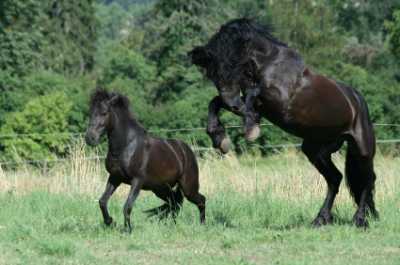|
By Jerry Tardif
You've no doubt occasionally wondered about herd dynamics.
Why must there be a herd leader, an "alpha"?
What about the other horses in the herd?
They seem to push around some of the herd just as the leader does to them.
Is there more than one leader?
If so, how many?
To answer the question mathematically, there n-1 leaders.
That means there are as many leaders in the herd as there are members minus one.
So, if you have eight horses in a herd, you have seven leaders.
That's because you have a pecking order numbered 1 through 8 that represents the chain of command.
Number one is the alpha at the top while number eight is at the bottom.
Except for the horse at the bottom of the order (number 8 in our example), every other horse is a leader of one or more horses below it.

The Boss
It's important to note that the pecking order will occasionally change.
All the lower horses are periodically testing the horses above.
If they sense weakness, they'll challenge the horse that's weaker than usual for his/her position.
Weakness can be caused by illness, injury, or just getting too old to want to fight, or to put up an adequate fight.
During this challenge, the horses will actually bite and kick each other — HARD!
Usually, one will quit when it's had enough and the winner will take the higher position in the pecking order.
Rarely, but it does happen, a horse will actually lose its position by getting killed.
But fortunately, the loser will more often quit than fight to the death.
In the fight, being bigger can help, but size is usually less important than determination.
A smaller, more determined and aggressive horse can win and even become the herd's alpha.
At a prior barn at which I used to board my horse, an Icelandic had to be kept separately because he would always fight and take over as the herd's leader.
In such fights, he just wouldn't give up and one time, he seriously injured the reigning alpha by kicking him in the legs (an advantage of being a shorter horse, such as an Icelandic, because they're pony size — 13 - 14 hh on average).
At the time, the barn owner realized she had to keep this horse separate from the others before one got seriously hurt, or worse.
You may be surprised to learn that some herd leaders go too far and are overbearing to the other herd members.
The result is that the other horses will stay out of the leader's way, but otherwise have nothing to do with him.
In such cases, the leader is alone — he has no horse friends.
No one will bond with him; no one will groom him; and it can be very hard psychologically on the leader, for he is a herd animal after all.
As violent as the foregoing may seem, this behavior has actually worked to keep the specie alive through the millennia — it's a form of natural selection.
The constant testing by underlings assures that only a strong enough candidate will be leader.
It's likely that, in the early days of the horse, that some tested their leaders while others did not.
It's similarly likely that those that did not test followed a weak leader to their eventual demise.
That left only those that do test as the equine survivors we know today as horses.
Besides being an avid trail rider, Jerry Tardif is a technology consultant and a horse and nature photographer in SE Connecticut — see his work at: www.jerrytardif.com.
He is also co-founder and President of QueryHorse.
Back to Article Index
|